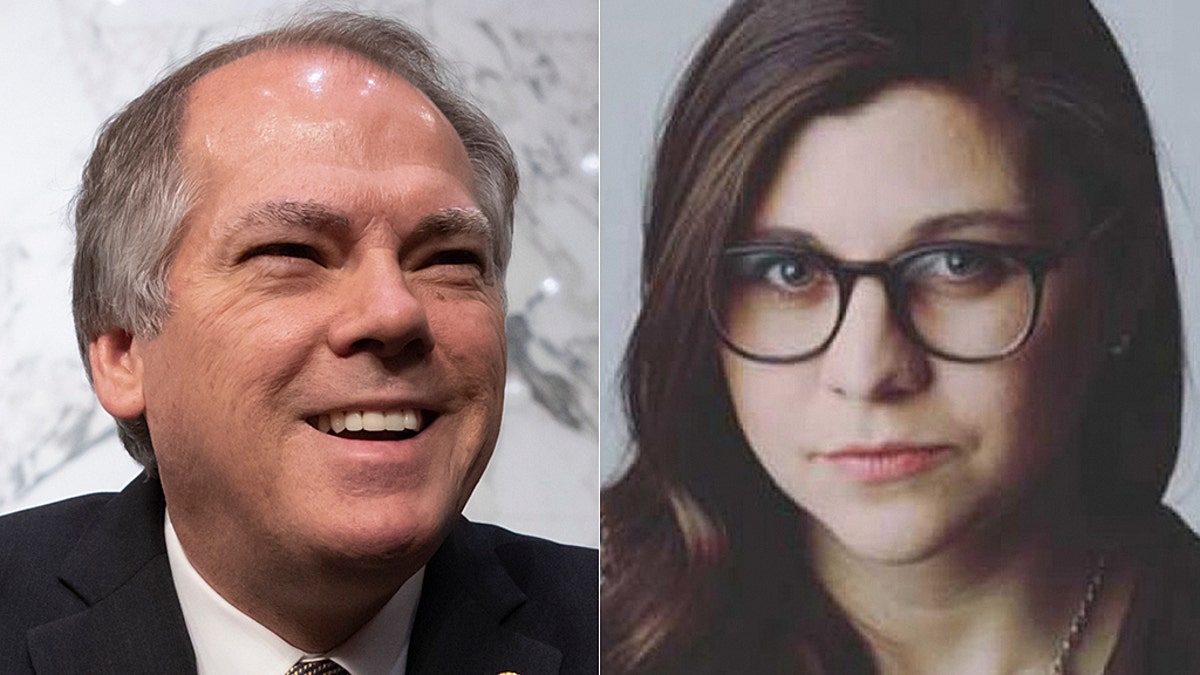
Former Senate aide James Wolfe was indicted for making false statements to the FBI about his contacts with reporters, including New York Times reporter Ali Watkins. (AP/Reuters/Twitter)
Government documents were leaked to the press. A reporter’s communications were seized by the government without her knowing about it. And a former Senate aide was charged with “lying repeatedly to investigators about his contacts with three reporters.”
It sounds like the makings of the next Hollywood production about the news media’s war against President Trump. There’s only one problem. The reporter wasn’t just involved with her stories. She was involved for three years with the man the feds charged.
The man is James A. Wolfe, the Senate Intelligence Committee’s director of security for nearly 30 years – an important figure for a young journalist to befriend.
Wolfe and Times reporter Ali Watkins “exchanged tens of thousands of electronic communications, often including daily texts and phone calls,” according to The Washington Post.
The Post described it this way: “How a reporter’s romance with her source muddies the FBI’s seizure of her records.”
“President Trump's administration excels at muddying the water, and the arrest of a former Senate aide, following an inquiry in which federal agents seized records from a New York Times reporter, might be its best work yet,” wrote Callum Borchers in The Post.
Most outlets weren’t that obvious. Especially The Times. Here are just a few of its headline choices: “Press Groups Criticize the Seizing of a Times Reporter’s Records.” Or “Times Says Justice Seized Reporter's Email, Phone Records.” Perhaps, even, “Former U.S. Senate Staffer Charged With Lying to FBI Over Contacts With Media.”
Notice the difference? The Times practices the CYA strategy known as “hide in plain sight.” It addresses the issue, but not until several paragraphs into the story, where only true news junkies read. A couple of those stories were written by The Associated Press and Reuters. In the Times version, we don’t learn until the seventh paragraph that “She and Mr. Wolfe had been in a three-year relationship.”
But there’s more. According to The Times, the Justice Department told Watkins back in February that it seized her records. Only she didn’t tell her bosses about the news.
“Ms. Watkins, after consulting with her lawyer, decided not to disclose the letter to The Times, according to Eileen Murphy, a spokeswoman for the newspaper.” Watkins waited until June. “Editors learned of the seizure from Ms. Watkins on Thursday, as reporters were working on an article about Mr. Wolfe’s impending arrest,” the Times wrote.
I bet Watkins’ editors were thrilled.
The Post story added several quotes defending Watkins, including those from when she worked at BuzzFeed and Politico.
Media ethics Professor Jane E. Kirtley tried to separate what was legal from “media ethics considerations” – for good reason. Then she used a unique public relations term for dating a source, calling it “a multidimensional relationship.”
The article even conveniently linked to the Society for Professional Journalists Code of Ethics, which reads in part: “Avoid conflicts of interest, real or perceived. Disclose unavoidable conflicts.” Apparently, that disclosure involves bosses, eventually, just not readers.
Watkins’ Twitter comments have also come back to haunt her. Back in 2013, she was tweeting about getting involved with a source.
“I wanted to be Zoe Barnes...until episode 4. Sleeping with your source- especially a vindictive congressman? #badlifechoice #HouseofCards,” she wrote in April. By June she asked, “So on a scale of 1 to ethical, how does everyone feel about pulling a @RealZoeBarnes for story ideas? #TOTALLYKIDDING @HouseofCards.”
Totally not kidding.
Bee Is Back: Fresh off a calling Ivanka Trump the C-word the week before, TBS comedy show host Samantha Bee was back for more. This time it was a thoroughly insincere apology on a broadcast so radioactive that most of her advertisers fled for the exits. None of those who advertised on the previous show were back for another round.
Bee argued her use of the word was innocent. She said she has used the word “on the show many times, hoping to reclaim it.” She took yet another swing at Texas Republican Sen. Ted Cruz. (She once called him a “fish-faced, horses--- salesman.”) This time she said: “I never intended it to hurt anyone except Ted Cruz.”
Still, Bee tried to take the sting out of her apology, claiming the classic comedian exemption. “If you are worried about the death of civility, don’t sweat it. I’m a comedian.”
Even The Washington Post called Bee out. Erik Wemple wrote: “We can worry plenty about the ‘niceness of our actions’ and refrain from calling Ivanka Trump a ‘feckless c---’ at the same time. It’s not an either-or proposition.”
Then Bee ended the pretend apology by talking about being nicer. “Civility is just nice words. Maybe we should all worry a little bit more about the niceness of our actions.” She’s a “comedian,” not a hypnotist. We don’t have to believe her.
Do As We Say, Not As We Do: Doxing is bad, just ask journalists who … do doxing. Wired describes doxing as “the distribution of someone's personal information across the internet against their will.” It’s become an awful tool of online combat. It can result in threats and job loss. It’s been used by extremists of almost every political stripe.
Lately, it’s become a tool of so-called journalism. The Daily Beast used it to target the daughters of conservative Pamela Geller. This time it was used both by and against HuffPost staff. Reporter Luke O’Brien went digging into the woman behind a popular Twitter account with about 220,000 followers.
O’Brien’s subsequent article didn’t just attack the author of the account. It went after her family. Here’s the unsubtle headline: “Trump’s Loudest Anti-Muslim Twitter Troll Is A Shady Vegan Married To An (Ousted) WWE Exec.” Only at the time he wasn’t “ousted.”
The story mentioned the woman’s husband who worked for pro wrestling’s WWE by name. O’Brien didn’t stop at targeting the man’s wife. He went after the man’s employer, asking for comment about the Twitter account.
O’Brien wasn’t satisfied with what he heard the first time from the WWE, so he tried again. This time he got results. “Now that it has come to our attention” the man (who I am choosing not to name) is no longer an employee,” said a WWE spokesperson. The completed story mentioned the WWE 10 separate times.
O’Brien’s story even brought in the woman’s brother and his wife, though they had nothing to do with her activities.
“Her brother runs a popular restaurant and craft beer bar in Brooklyn that also bears the family name,” O’Brien wrote.
In the resulting battle, O’Brien was doxed, as were many others on the HuffPost staff. O’Brien was also suspended from Twitter for telling someone to “Go DDT himself,” which he claims believably was intended to reference a wrestling move. He also said less believably that his reporting was, “EXACTLY how ethical journalism works.”
HuffPost Editor-in-Chief Lydia Polgreen defended the story: “Doxing is revealing a person’s private information: home address, telephone number, etc. Identifying a popular anonymous troll by name is NOT doxing,” she wrote, seemingly forgetting the woman’s husband, as well as her brother and his wife.
Polgreen added that “private information of 10 of my colleagues – some of whom had no connection to this reporter – was also doxed.” She concluded with an ironic truism: “It’s scary stuff.”
It’s scary for everyone, not just journalists.

